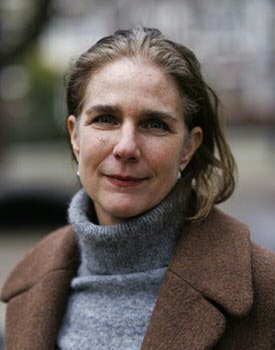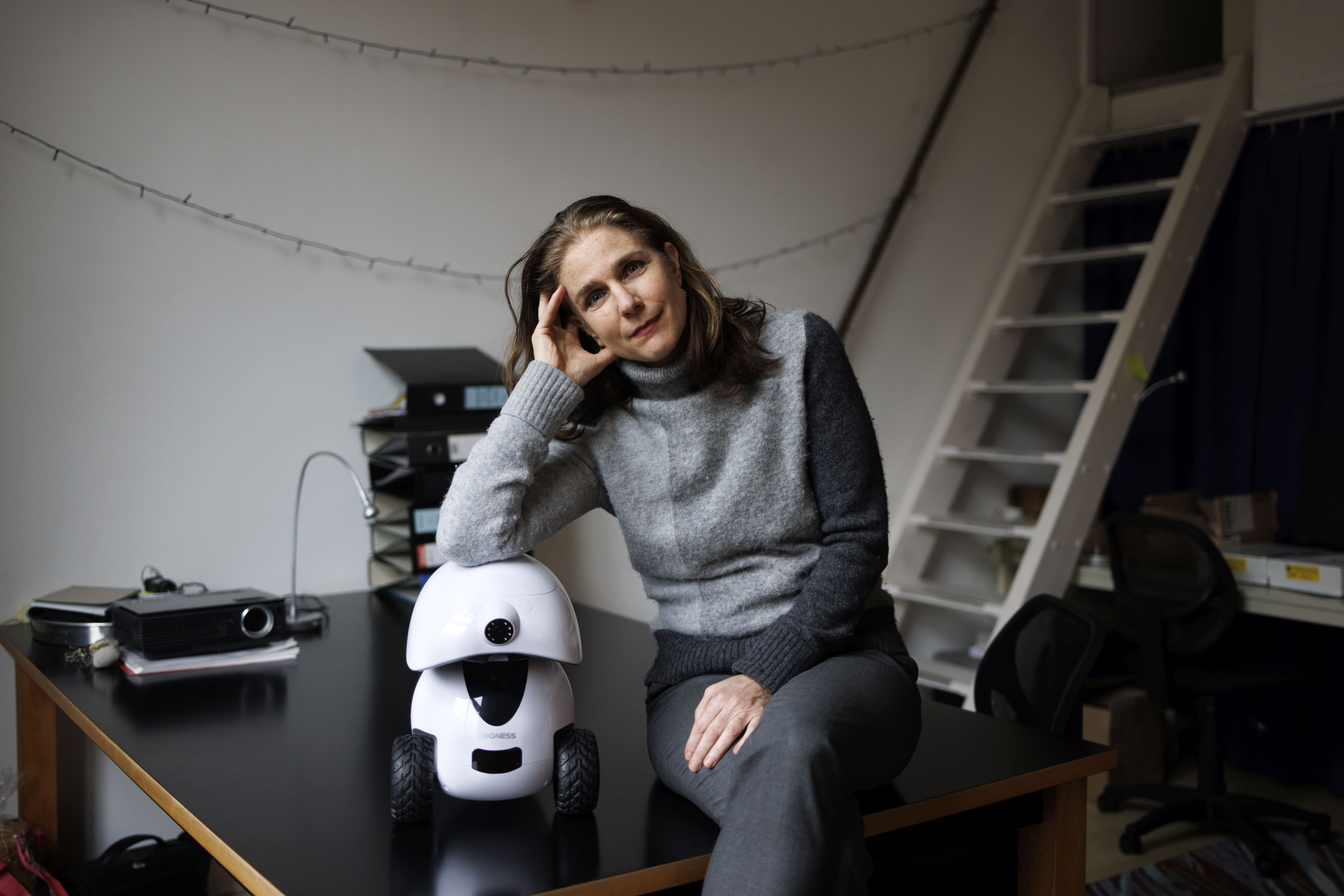Rebecca Gomperts: ‘Abortion is a human right’

When Rebecca Gomperts is presented with the Aletta Jacobs Prize by Rector Magnificus Cisca Wijmenga on 8 March, her thoughts will undoubtedly turn to previous recipients of the prize, such as Els Borst, Gunilla Kleiverda, and Khadija Arib. But at the forefront of her mind will be the women who still do not have access to a safe abortion. ‘Abortion is not a medical issue,’ Gomperts claims. ‘It’s a human right – a right that is being violated all around the world. In the twenty years since the abortion pill became available, maternal mortality resulting from unsafe abortion has dropped from 100,000 to 25,000 per year. True. But as far as I am concerned, every woman who dies needlessly is one too many.’
Text: Marjan Brouwers/Photos: Jeroen van Kooten
Rebecca Gomperts has earned an international reputation as a leading reproductive justice advocate and founder of Women on Waves. It was while working as a junior house officer in Guinea that she first witnessed how terrible the consequences of unwanted pregnancies and illegal abortions could be. During her voyages on Greenpeace’s Rainbow Warrior II, she spoke with women in South America about their horrific experiences with unwanted pregnancies and failed abortions. ‘Those women were the inspiration behind Women on Waves.’
Abortion services outside territorial waters
Between 1999 and 2017, Gomperts undertook multiple sailing trips to countries where women did not yet have access to a safe, legal abortion. The boat docked, and pregnant women came aboard. The boat then sailed them out to a point just outside the territorial waters, where a team of female doctors provided each woman with a consultation, information, contraception, and an early abortion or a medical abortion using abortion pills. ‘Each trip was prepared thoroughly’, Gomperts explains. ‘We liaised closely with local networks of GPs, gynaecologists, women’s organizations, and lawyers. The risk of complications following a medical abortion is tiny: less than one percent. But if a woman did encounter a problem, she could always come back on board and be seen by one of our doctors.’
Breaking the taboo
Women on Waves succeeded in visiting almost every country that can be accessed via international waters. A growing number of countries are now offering legalized medical abortion up to nine weeks. ‘We acted as a catalyst for the legalization of the abortion pill in many countries’, Gompert says. ‘Because we helped to break the taboo surrounding its use, many more women are now able to access the abortion pill than used to be the case.’ The boat made its last voyage in 2017, but the campaign continues. Since 2005, women have been able to access the abortion pill via an internet platform called Women on Web. And in 2018, Gomperts founded Aid Access as a means of extending help to women living in the United States.
The fight against social injustice
Gompert has already achieved much through her activism but there is much more she still wants to do. ‘The fact that so many women still do not have access to abortion services is a gross social injustice. Part of the problem lies in the legislation in the country where they live, but money is also a major factor. If you don’t have money and you don’t have decent health insurance, you can’t pay for an abortion. Many of the women who have no choice but to carry the baby to term find themselves locked into long-term poverty. The best way of keeping people poor is to force them to give birth to children they can’t take care of. Privileged women, by which I mean those who have access to money and information, will always find a way to access abortion, even if they live in a country where it is forbidden.’

Necessity, not choice
Gomperts highlights the fact that many women seeking abortion have no choice. ‘Women who are pregnant but really don’t want to be, for whatever reason, will do anything to terminate the pregnancy. It’s often a question of dire necessity. And if they aren’t able to access abortion via legal channels, they will find someone who is willing to do it illegally. But at what price? Making something illegal also makes it expensive and these women are vulnerable to abuse. I spoke to a girl in Mexico with an unwanted pregnancy. Someone posing as a doctor had agreed to help her – for a hefty fee. But what actually happened was that he raped her and ran off with the money.’
Safer than pregnancy
Gomperts strongly opposes the notion that abortion is to be avoided at any cost. ‘Pregnancy is one of the riskiest periods in a woman’s life. And yet nobody asks her whether she is prepared to put her life on the line in order to bring a child into the world. In the Netherlands, one in 10,000–20,000 women dies during pregnancy or childbirth. Abortion is safer than carrying a pregnancy to term, but, if you have an unwanted pregnancy, the onus is on you to explain why you want an abortion. Why?’ She deplores the fact that since the introduction of the Abortion Act in the Netherlands, this attitude has not changed. It is true that in February 2022, a comfortable majority of Dutch MPs voted in favour of scrapping the five-day waiting period for an abortion, but Gomperts is unimpressed. ‘I think the very existence of an Abortion Act and abortion clinics is wrong. Abortion is a medical procedure that has no place in criminal law. If you have an unwanted pregnancy, you should just be able to get a prescription from your GP. It is part of a GP’s job to help with miscarriages, isn’t it? And then you should just be able to collect your abortion pill from the pharmacy or go to a clinic or a hospital for a surgical abortion. It’s beyond sad that here in the Netherlands we still haven’t managed to get this organized properly.’
An alternative to the pill
For years now, Gomperts has also been arguing for a new generation of contraceptives that do not bring with them the hormonal side effects associated with existing pills and the coil. ‘It says a lot about our society that we consider it acceptable for women to put their lives at risk in order to avoid falling pregnant. Women who are on the pill run a 1 in 2,000 risk of getting thrombosis, not to mention the loss of libido, the increased risk of breast cancer, and the threat of depression and suicide. How come we think that is normal and yet we reject a coronavirus vaccine that carries a 1 in 200,000 risk of thrombosis? I want to bring about change here too.’ Over the next decade, Gomperts will be working on an alternative drug that women can use to regulate their periods and prevent pregnancy. ‘The active ingredient in the abortion pill can be used as a contraceptive and a morning-after pill. But now that the patent on that ingredient has expired, it is no longer of any interest to the pharmaceutical companies. My dream is to find a way to market this new pill safely.’
Aletta Jacobs Prize
Every two years, the University of Groningen awards the Aletta Jacobs Prize to a woman with an academic background who has distinguished herself in the field of emancipation, at a national or international level. Previous winners of the prize include Khadija Arib, Neelie Kroes, Lilian Gonçalves-Ho Kang You, and Els Borst. The jury commended Gomperts’ courageous and tireless dedication to improving the lives of women across the globe. Almost 151 years have passed since Aletta Jacobs embarked on her medical training in Groningen. In the words of jury member Janka Stoker, ‘Gomperts demonstrates the same passionate, inspiring commitment to women’s health rights that Jacobs showed in her day. We couldn’t have wished for a more appropriate winner.’
Livestream ceremony
If you want to follow the ceremony, you can do so via our livestream. There will be a support act from 3:00 PM to 3:30 PM with short speeches and a compilation of images from the documentary 'Vessel' made in 2014 about Rebecca Gomperts and her work. You can follow the award ceremony live from 3.30 pm.
Read more about the Aletta Jacobs Prize
| Last modified: | 18 July 2024 2.58 p.m. |
More news
-
16 December 2024
Jouke de Vries: ‘The University will have to be flexible’
2024 was a festive year for the University of Groningen. Jouke de Vries, the chair of the Executive Board, looks back.
-
10 June 2024
Swarming around a skyscraper
Every two weeks, UG Makers puts the spotlight on a researcher who has created something tangible, ranging from homemade measuring equipment for academic research to small or larger products that can change our daily lives. That is how UG...
